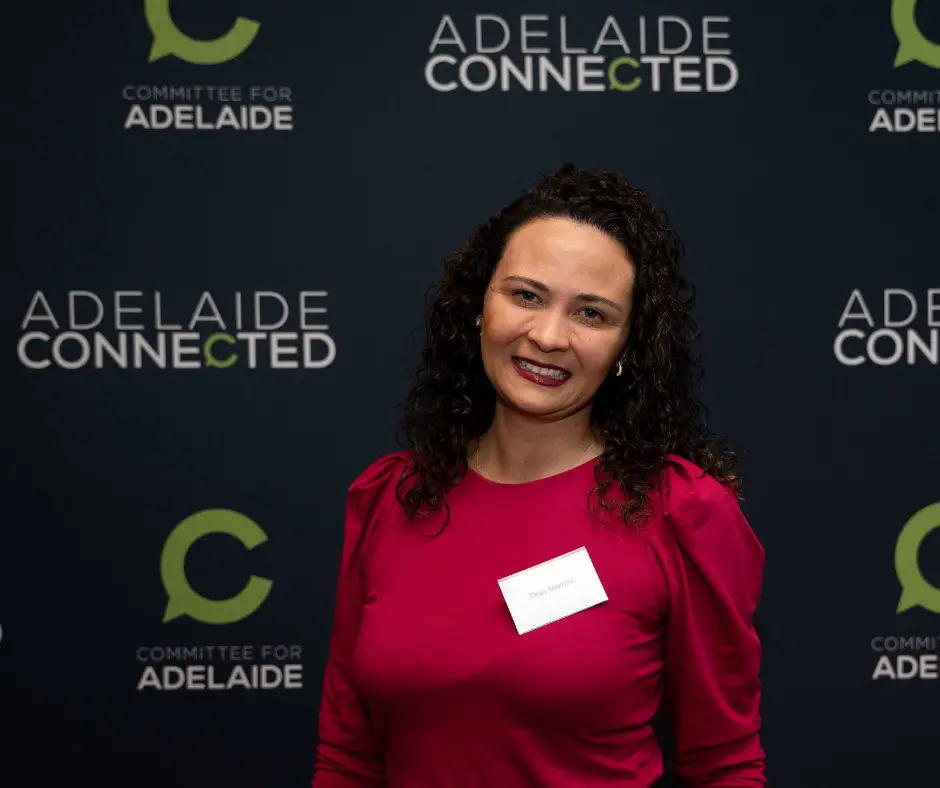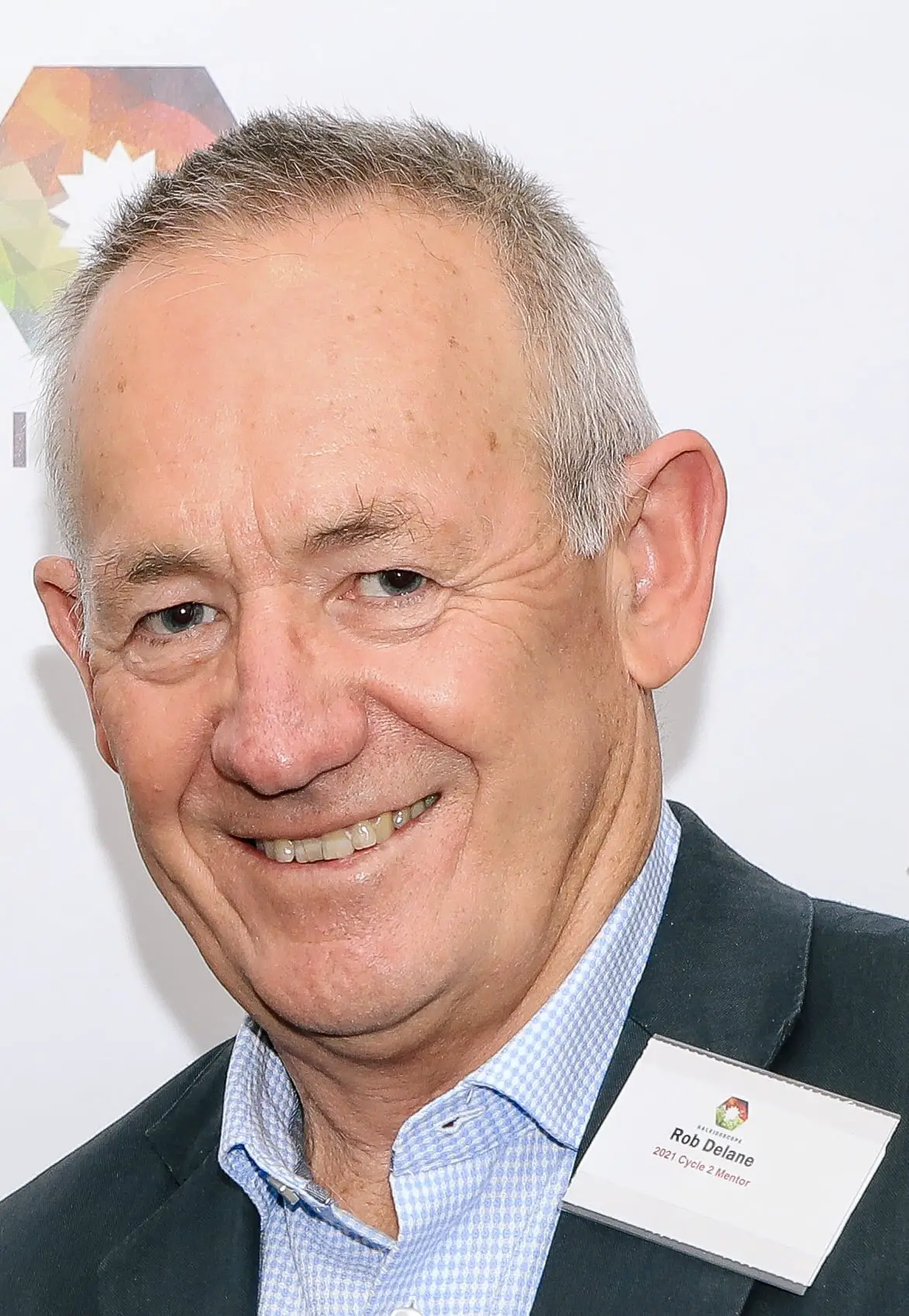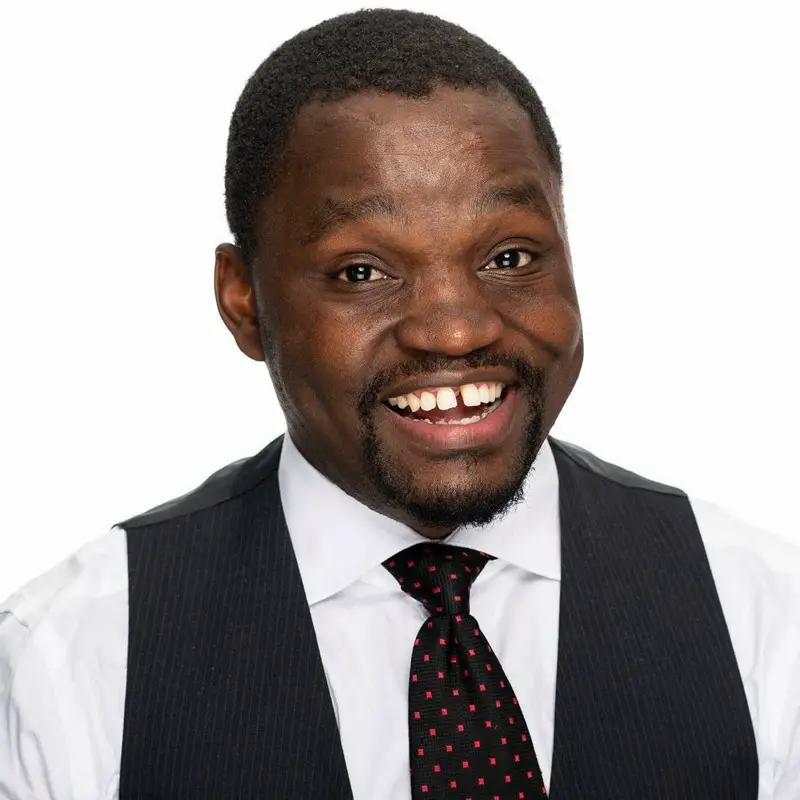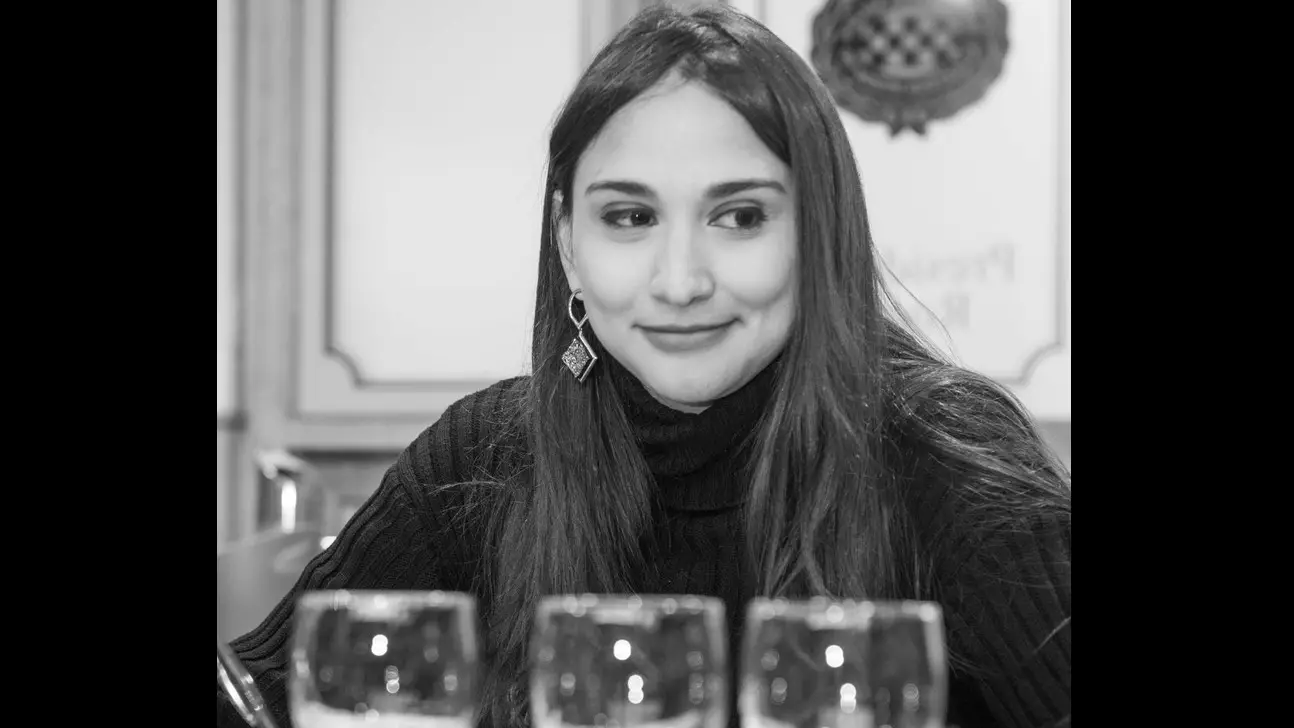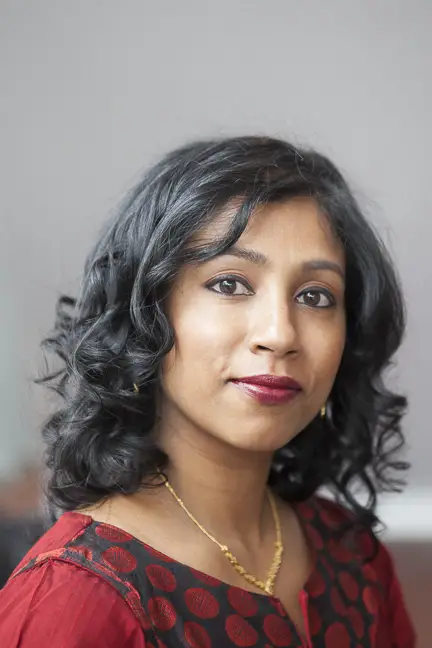Meet Thais Martins, a communications and marketing specialist hailing from the vibrant nation of Brazil. Currently, she calls South Australia her home, where her expertise and passion converge to shape her professional journey in the ever-evolving field of marketing and communications. Join us as we delve into Thais’s unique story and her experiences in the land down under for ‘Heartwarming stories From Australia’

Hi Thais, there is always a story behind a big move like migrating to another country. So what was your story that brought you from Brazil to Australia?
I’ve always been curious to explore new cultures and experience living abroad. However, since the beginning of my journalism internship, I dove into work, consistently progressing in my career without breaks. When my daughter, Alice, turned 7, an idea took hold in my mind: what if living abroad could show her the diversity of the world and offer broader opportunities?
The idea was not simple. Both my husband, Paolo, and I had established careers in Brazil, and moving our lives to an unknown place had its own risks. But we talked a lot, considering the advantages and disadvantages, the dreams, and practical realities.
After extensive research on potential countries – the United States, Canada, and Australia – we felt that Australia had the right environment for raising a child, potential for us to thrive in our careers, and the lifestyle we aspired to for our family.
Thus, on January 8, 2020, Paolo, Alice, and I landed in Australia, carrying only six suitcases and minds driven by the burning desire to fulfill our dreams. We love Brazil and had a comfortable life there. With stable jobs, Alice in a good school, a home of our own, frequent travel, our family close – a security that one only appreciates when one starts living on the other side of the world.
Embarking on this immigration journey to another country means leaving the comfort zone and face the unknown. As mentioned, from all that we researched, we believe that here in Australia we would have the opportunity to continue working in our careers and also provide Alice opportunities different from those we would have in Brazil.
Thais, now you’re working as a communications specialist. Was this similar to your career in Brazil? Can you share more about your experiences in navigating the Australian job market as a skilled migrant, including any specific challenges you’ve encountered and how you’ve addressed them?
I am working in the same field as in Brazil, and it has always been one of my aims to work in my professional area in the Australian market. Overcoming the job market entry was the first barrier… local experience, writing a cover letter, the dynamics of the interview process, so I started to reach out to the Brazilian community to gain insights about my career in Adelaide. To hasten the learning curve, I engaged a career coach.
In Brazil, we place a high value on educational history, and on a resume, we usually start with this information. However, here in Australia, you begin with your work experience and list your education at the end.
In general, the Australian work culture is more relaxed, quite different from my home country and other Latin American countries where I’ve had the opportunity to work. Here, the recruitment process is more straightforward and job interviews are more focused. It’s essential to be concise in your responses and highlight professional accomplishments. We must learn to write an effective cover letter and understand how job interviews are managed; everything is done in a unique way, I believe.
In addition, in Brazil, I had established a strong network of contacts, whereas here I am in the process of building one, especially at events which, in the last years, were disrupted due to the COVID pandemic. It is a challenge, I admit, but now I regard myself as a global professional. I can offer a global perspective, which is an asset I can offer to companies. I am adept at navigating a multicultural work environment.
In a thought-provoking email from you that was shared on linkedin: https://www.linkedin.com/pulse/open-letter-from-thais-natalie-peart-Your experience highlights the potential biases in recruitment, such as the suggestion to use an English nickname on your resume and LinkedIn. How do you think employers and recruitment platforms can be more inclusive and prevent such biases from affecting hiring decisions?
I believe that companies and individuals are making progress in this area. It’s not an easy issue to solve, as it is a recurrent one. We still live in a society that holds biases and often privileges a select group of people, but there are genuine efforts underway to change this narrative.
With over 15 years of experience in communication, I see businesses investing in systems and processes to minimise situations that can cause embarrassment and even harm to the companies. It’s accurate to say that there is a lot of discussion but not enough action on this matter, yet we are increasingly witnessing the integration of inclusion and diversity into corporate cultures.
Society and the generations entering the workforce are very diverse, but recruitment processes still use the same strategies. In general, hiring processes do not seem transparent because recruiters treat all candidates uniformly, while in this constantly evolving society, the approach could be more diversified. For example, at a conference I attended, a recruiter suggested the possibility of informing a candidate, for whom English is not the first language of the main questions that will be asked in advance.
As a communicator and participant in selection processes, I believe that when this language barrier is diminished, half the pressure that occurs during an interview and the performance are significantly better. Wouldn’t we consider this a much more equitable rather than equal selection process?
I always search for job advertisements that state they welcome individuals from a variety of cultural and linguistic backgrounds, but in the everyday workplace, they do not welcome and do not offer a safe space for the different. My personal takeaway as a job seeker is to analyse a company to determine if it genuinely values diversity, as this is one of my non-negotiable points. In my interviews, I like to ask about the company’s diversity, because this aspect is crucial to me, and the work environment is a two-way process, an experience where everyone wins.
What are some of the successful job search stories you’ve heard from people in your circle? What other support do you think these migrants can explore?
In my view, migrants must be even more persistent in achieving their goals and remain open to new attempts.
I am part of a Migrant Women Professional Network here in Adelaide, and I see that this same support network also exists in other states. It’s heartening to know that despite facing a much tougher battle in career transition when moving countries, there are countless success stories. Immigrant women who are at universities, working in hospitals, expanding the local market, and sharing their experiences to inspire those who are still pursuing their career dreams.

Everyone has their own journey within the migration process. There are also cases of people who have had to return to more operational roles within their qualifications and others who are starting businesses or have completely changed their professional field and are happy with their new careers.
Could you share some of the strategies or resources you’ve utilized to up-skill and integrate into the Australian workplace? What advice do you have for other migrants seeking to do the same?
I believe it is essential for professionals to be able to identify the most effective strategies for transitioning their career to the Australian job market. What I can share from my journey is that I was able to make the most of all the opportunities that came my way.
One of my first jobs in Australia was at a Fish and Chips shop. Although it was not related to my field of study, the owners opened the door for me to manage the business’s social media accounts. This turned out to be one of the most valuable lessons in nearly four years here:
Be determined in your pursuit.
Opportunities arise where you least expect them. The key is in knowing how to identify them. I dedicated part of my time to establishing connections and building a new professional network. I used LinkedIn to connect with various individuals and began attending events in my sector as an observer, watching seminars and lectures related to my field, always expanding my network with individuals who could enrich my professional capabilities.
I also decided to pursue a diploma in project management at TAFE to expand my networking, deepen my understanding of the Australian work culture, and interact with professionals from various fields, providing me with a broader perspective on the Australian job market.
It is crucial to seek out professionals working in your field, understand the market, your strengths as a professional, the existing gaps, and what you need to adapt to successfully integrate.
There are many memorable experiences for you and your family since the move in 2020. Thais, what is one thing that you have accomplished/enjoyed here in Australia that you would never have done back in Brazil?
Since our arrival in January 2020, our life has been filled with intense and varied emotions. The pandemic brought us unimaginable challenges, cultural and linguistic adaptation, as well as transitioning our careers and studies to this new Australian context – all while we cultivate precious family moments. Camping has become our favourite activity, allowing us to immerse ourselves in Australia’s stunning landscapes, whether in a tent or, perhaps soon, in a caravan, something not so common in Brazilian culture.
Living close to the ocean and nature has been a pleasure for us, who previously lived in São Paulo, a city of 12 million people – a number that corresponds to half the population of Australia. And, even though Adelaide greets us with winters more intense than the tropical heat we were used to, learning to appreciate the striking distinction between the seasons has been a delightful discovery.
Thais, you are passionate about brand marketing and customer experience. Someone who would like to explore this field, what steps should they take?
Focusing on the audience has been the essence of my journey since the beginning of my career as a journalist and, later, on the customer, as a marketing specialist. For those passionate about these fields, it is crucial to acknowledge that customer experience only takes shape with a genuine focus on the customer, and a brand truly becomes established by addressing the needs of its clients.
Brands hold the capability to transform and strengthen societies. It is essential to stay updated in a world that is constantly changing, to stay alert to trends and human behaviour.
In my first position within my field here in Australia, I worked for a company headquartered in Melbourne that aimed to extend its presence to other states. The business, established for nearly a decade and well-received in Victoria and New South Wales, faced the challenge of launching its operations in South Australia and strengthening its digital presence. In nearly two years of effort, we not only established the products in two major local market chains but also significantly increased brand recognition. These successes are the result of a firm commitment to excellence in customer service.
For those aspiring to specialise in brand marketing and customer experience, it is essential to sharply define the company’s goals, ensure the narrative is consistent with the actions, and cultivate a keen perception of human behaviour in order to implement effective communication and marketing strategies.
Apart from a successful career, how else do you think you’ve grown as a person since the move to Australia?
My answer might seem curious, but I would say that with each passing day, I become more profoundly human, and I truly enjoy interacting with people, learning more about them and alongside them. Not just for myself, but for my daughter too.
At home, we discuss topics that perhaps we would never have had the opportunity to address if we weren’t immigrants. The person she is becoming is shaped by these experiences. I’ve always been driven by purpose and, after living these new experiences, I feel an even stronger desire to use my skills to contribute to society.
If we are not here on Earth Planet to help each other, then I find myself questioning what my mission is. I take pride in saying that I am Latina and I want to be part of this community of migrants, actively contributing to our collective well-being.
Could you share any memorable or heartwarming experiences you’ve had since moving to Australia that have contributed to your sense of belonging and acceptance in Australia?
The school environment for my daughter is precious. My only concern with moving to Australia was her adaptation. The government promotes a safe space, and her school includes over 12 nationalities, making the school setting very interesting. When she says, “I love this place and make plans for the future,” it shows me that it’s a right place for my daughter to grow and make plans. Seeing children from different parts of the world sleeping in our house, playing, and blending their diversities is truly thrilling and shows me that this is the way to build a kind Australian society.
What future aspirations do you have as a member of the Australian community, Thais?
Since the 7th of July this year, our permanent visa has been granted, and we have achieved one of our main goals here in Australia. Now, a new chapter begins in our lives, as this is a document that secures our ability to make long-term plans with certainty. I am open to new job opportunities and wish to contribute to a diverse, productive Australia that is ready to compete on the global stage.
I believe that all my professional experience can be valued here in Australia, and I also wish to deepen my understanding of the culture and diversity of this country that I am very proud to call home. It is just the beginning of a book that is in its introduction.
Thais, we’ve come to the end of the sharing session. Any other sharing/tips/suggestions for the readers of Australiamovingplan.com?
I want to thank you for the opportunity to share with the readers of Australiamovingplan.com a bit of my story and my family’s move to Australia. This is an amazing country, filled with opportunities and challenges to be overcome as an immigrant, and DO NOT GIVE UP ON YOUR DREAMS! It’s in capital letters because it’s what I repeat to myself in the tough situations I face. IT MAY BE HARD, BUT NOT IMPOSSIBLE.
The beginning is usually uncomfortable, but with a few steps, we keep walking. If you want to come to Australia, start researching the cities, the lifestyle, always improve your English, because without the language barrier, the experience will be better, connect with people to ask about Australia and learn more about the Australian work environment.
If there’s any marketing and communication professional reading this interview, I’d be more than happy to help. If you’re in Adelaide, the coffee is on me! Otherwise, enjoy the journey, as a human being you have much to learn from this life experience.
To connect with Thais: linkedin.com/in/martinsthais

